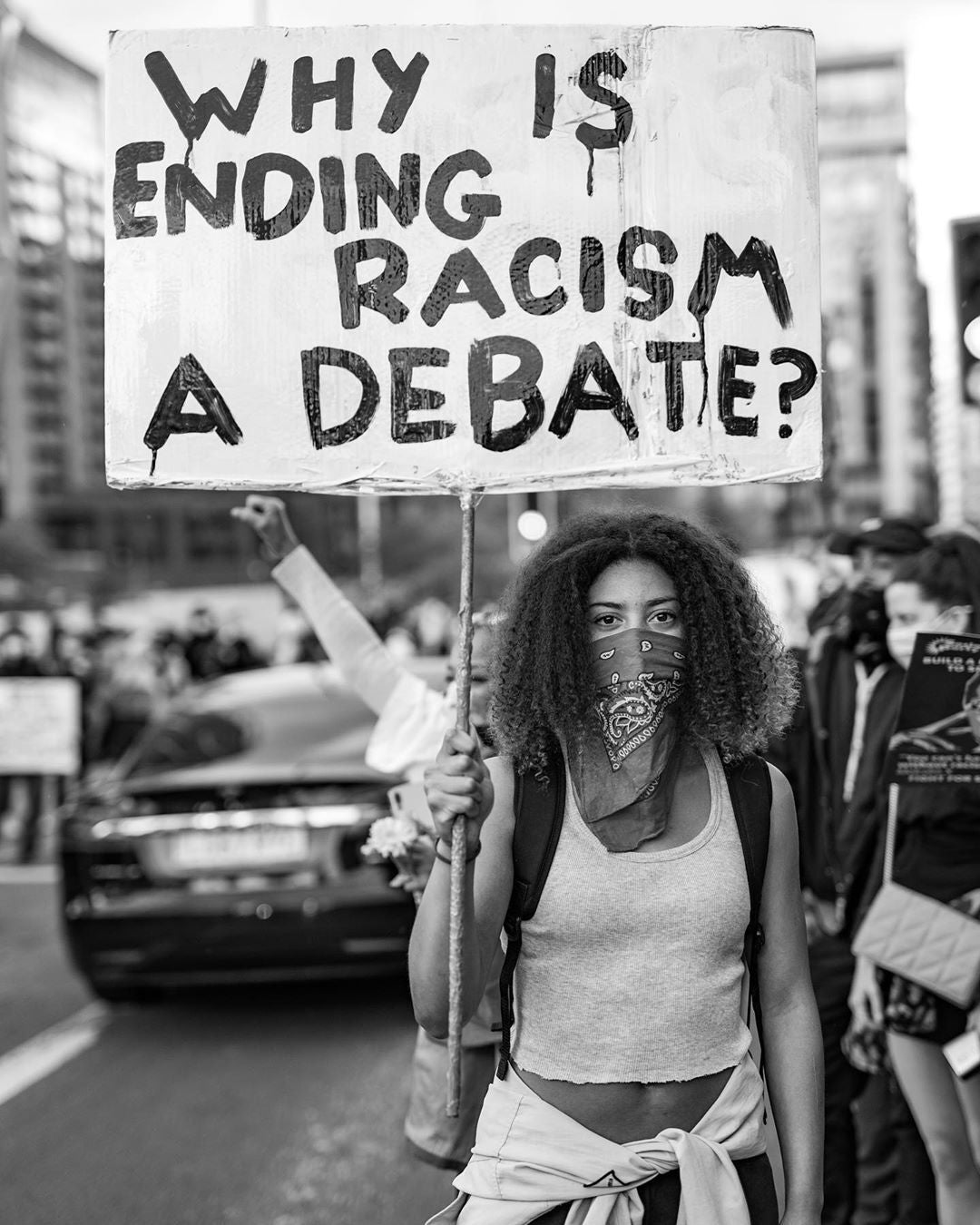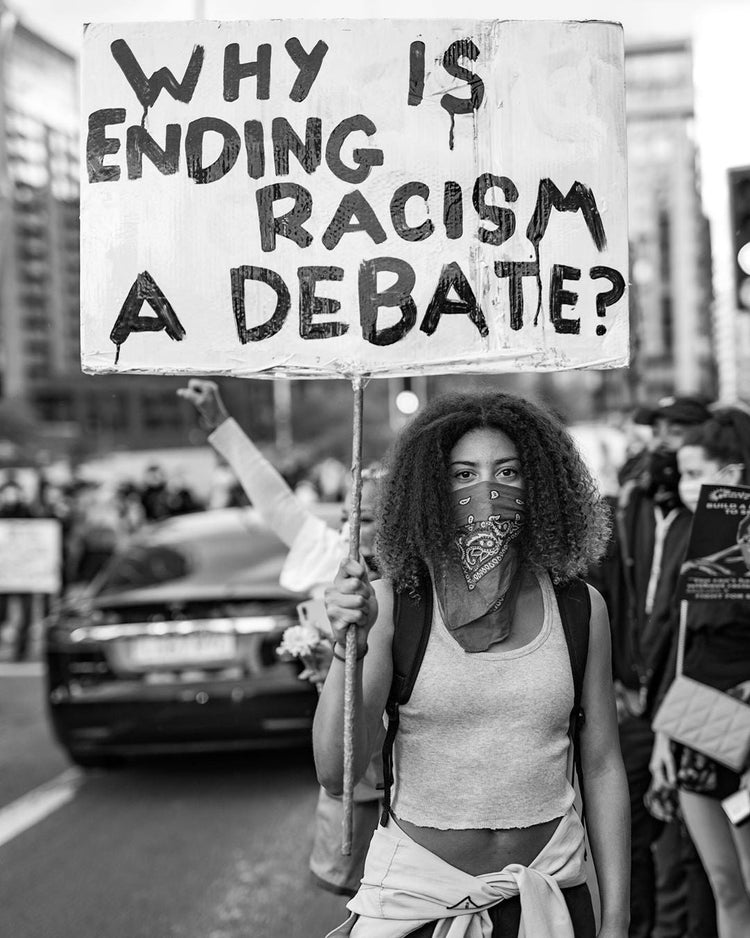Darcy Bourne: Pitches, Protests + Platforms


If you’ve so much as logged on to social media in the past month, it’s likely that you’ll recognise Darcy Bourne’s face (or at least half of it since protesting amidst a pandemic means face coverings). Misan Harriman’s image of the 18-year old holding a sign with the poignant words “Why is ending racism a debate?” ignited a series of reposts from influential figures across fashion, sport and politics including British Vogue editor Edward Enninful, athlete Dina Asher-Smith, Formula 1 world champion Lewis Hamilton and Martin Luther King III.
We speak to Darcy Bourne about following her American Dream to the Olympics while using her platform to pave the way for more black female role models in hockey, educate and advocate for anti-racism.
What ignited your passion for hockey?
I’ve always been interested in sports since I was really young; one of my first memories is watching the Olympics on the TV and thinking to myself “Woah, I want to do that”—I didn’t care what sport it was, I just wanted to do it. From a young age, I was involved in every sport you could possibly imagine; I even played in a boys’ football team as I really wanted to play but there wasn’t a girls’ team, and then in Year 4 the teachers thought I was too old to be playing with the boys so introduced me to hockey. I was really competitive, and because the girls had been playing longer than me, they were better than me, but once I joined the club and got the hang of it, I fell in love and things started to happen.
You’ve spoken about how open and accepting hockey is compared to other sports. Which sports do you think have the longest way to go?
I’ve played a mix of team and individual sports, and I played tennis and loved it but it was such a harsh environment for someone so young if you’re on your own—it’s really competitive and the parents were very competitive from the side so if you lost, it was a lot of weight on your shoulders. I prefer being in a team where you carry each other, you work for each other and if you lose, it’s a shame but you have to move on together so you can prepare for the next game.

How do you incorporate activism into your everyday life?
I’ve only become more outspoken recently since the Black Lives Matter movement blew up after George Floyd’s death. I’ve always felt really strongly and passionately about it, and went to the protest because I felt like it was something that I needed to do, then that photo went viral and now I feel like I have a platform that I can use to try to make a difference and have an impact and educate others. During lockdown, I’ve been taking the time to educate myself because I don’t know everything about racism, to educate my friends and my family who aren’t aware of it, to sign petitions, and to try and speak out and let the word be spread. One of the big things about racism in the UK is that people are unaware because it’s more systemic, rather than people actively being racist.
Teammates in my ladies team who are in their 20s and 30s that I’ve always looked up to have reached out to me with questions so it’s weird it being the other way around, but it’s really nice to see that people are making the effort to educate themselves. It means a lot when people show that they care. It’s really important not just to be ‘not racist’ but to be actively anti-racist.
What would you like to see change in your industry?
Although hockey accepts everyone, there is a huge lack of ethical diversity and it’s predominantly a white sport. Growing up, hockey was the last sport I started and in my head I’m sure that wasn’t because there weren't black role models for me but it could have been a subconscious bias maybe. I think that for young kids starting a sport, it’s really important to have role models that look like them so they can look up and think, “That could be me, I could be part of that sport and be successful.”
Who inspires you?
When I was playing tennis, I really looked up to the Williams sisters, because they’re just iconic, and with athletics it was Dina Asher-Smith. I was so excited when Dina posted the photo of me from the protest, as I’ve always looked up to her. I’ve also been inspired by Georgie Twig who’s in my ladies team. She was the face of GB hockey when I was growing up, and she was at my club so she was a close role model that I could reach out to.
What is your biggest motivation?
I’ve had this end goal of trying to get to the Olympics since I was five years old, so I plan things around that end goal because it’s still the dream for me. During lockdown and having the opportunity to have a platform for the Black Lives Matter movement has made me think that I want to do something bigger and more impactful to the rest of the world.
What does your training routine entail?
It’s a lot because last year I was in the England U21 squad but also the women’s Elite Development Programme which is the step below the full senior team. Most people on it are at university and their programmes work around that but I was one of two who was still at school so I had my school programme, club programme and EDP. It was a lot but I really enjoyed it and felt like I had to put in the effort if I wanted to get anything out because everyone around me was doing it as well.
What are the biggest challenges you face going into adulthood in the spotlight?
It’s a lot of pressure as I’ve now openly said my goals whereas previously just myself and my family knew, but I’ve been in high-pressure situations before and am hoping that it doesn’t affect me negatively but instead pushes me further towards my goal.
How does competitive sport affect your approach to wellness?
Wellness is something that I’ve only considered recently. It became important to me when my sports started getting really serious at the same time as my academics so I guess they both collided and I realised that if I'm not taking care of myself both physically and mentally, it can become overwhelming. Within academics and sport, you’ve still got to take the time to have fun and be normal. I found that making sure I had time for myself to rest and to have fun and take care of my body was really important for the mental side, while physically it was making my nutrition right so I can hit those running and gym sessions and sleep right so I have enough energy to get going each day. Those were the things I found really important in the last few years, and I could feel the difference from when I was eating and sleeping well to when I wasn’t; it directly affected my performance, my mood and my schoolwork.
I was quite lucky because I’ve been in the singles system in the England programme since I was 13 or 14, and we’re always told about nutrition and a bit about psychology but my school and college had a big thing about wellness. Although I questioned mindfulness and thought it was stupid in the beginning, now that my life is much busier I can appreciate the importance of it. Outside of sport, people are realising the amount of emotional stress students go through and how important our mental health is. I think it's good that they try and encourage awareness from a younger age.
What are the effects of competitive sport on your mental health?
It can go either way. For me personally, if I go a few days without playing sport I get really grumpy because I need the endorphins. Playing sport keeps me going because I really enjoy it. Obviously, if you have a setback or a few deselections that can really affect how you’re feeling and it can be demoralising. You’ve often got more on your plate than the ordinary school or uni student, so that can be quite stressful in itself but being a sportsperson you learn to be more organised and your time management increases so I think in the end it becomes easier to be busy.
When it comes to exams, you’ve got to realise that a few things have got to go because it’s almost impossible to keep things up to the absolute top level. Because I’m so competitive, I want to be the best at everything—I want to make every hockey training session but I want to get the top exams. Ultimately it’s a very difficult combination to balance.
What do you think are essential traits in becoming a successful sportsperson?
I think recently businesses have been reaching out to sportspeople because of the qualities we hold through playing sport. If you’re part of a team, that’s great in the workplace because you know how to interact and work with people; you know how to motivate each other; you’re adaptable; you can think quickly because if you’re in a match you have to think up solutions. A big part of it is the competitiveness and grit and determination because we’re used to having to fight really hard to get something; it’s the long-haul when you train every day for something eight months or three years later.
What are your expectations of moving to America for your hockey scholarship at Duke?
One of the big reasons for the move is the culture around sport; how much effort everyone puts into it and how much they believe in sportspeople. I love that, so I’m really excited to be in an environment where you’re treated as a student athlete. I think that’s going to really aid my development because I can focus on my sport without having to worry about other factors as much. Obviously I’ll still be studying but the way the programmes are out there is so sport-orientated. I also love travelling, and it’s a great opportunity for me to experience a different culture alongside getting a degree and continuing to do my training.
Do you have a mantra or have you received any advice that has stayed with you?
One thing that I’ve always said is that you’ve got to use every second of every day to make yourself a better person; each and every second can count towards what you want to achieve. The one second where you’re not doing something could be the one where someone else is doing it. That’s what I think about when I’m really motivated. This time during lockdown has given me time to relax and reset but now I’m really ready to go.
Main image shot by Misan Harriman